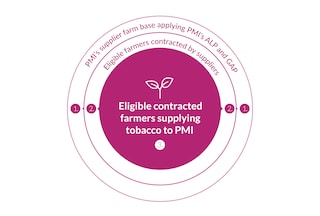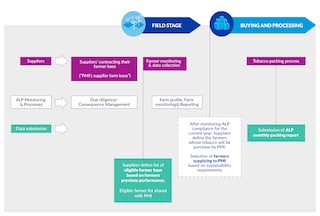PMI's commitment to business practices that respect internationally recognized human rights extends to its supply chain, with a particular focus on its agricultural supply chain due to its specific vulnerabilities. This article aims to provide information about our Sustainable Tobacco Supply Chain (STSC) framework, which we introduced in 2022 to increase traceability, allow sound monitoring, and obtain more reliable data of the conditions on the ground related to the tobacco we purchase. The STSC framework lays the foundation for our efforts to achieve continuous progress in improving the livelihoods of tobacco farming communities.
1. PMI’s Agricultural Labor Practices program - over 10 years of impact creation
Agriculture is integral to PMI and, throughout our history, we have worked directly and indirectly with tobacco farmers around the world. In recognition of our commitment to respect the human rights of the many people who produce tobacco for us, PMI adopted in 2011 the Agricultural Labor Practices Program (ALP) with the aim to eliminate child labor and other labor abuses, and to provide a decent livelihood to contracted farmers in our tobacco supply chain.
The ALP program has been a key focus for PMI for over ten years, and we have gathered significant learnings on how to prevent, identify, and remedy potential and actual human rights-related issues resulting from tobacco growing. As the program has matured and been implemented at scale globally, our aim is to continuously improve our policies and practices towards consistent, continuous, and meaningful impact.
2. Introduction to the Sustainable Tobacco Supply Chain framework
At the forefront of our approach to continuously strengthen and refine our ALP program, is PMI's Sustainable Tobacco Supply Chain (STSC) framework, a comprehensive approach that PMI initiated in 2022. The aim of this new approach is to address the sustainability risks and impacts in the countries where PMI sources its tobacco. In this respect, during 2022 we analyzed past results from internal monitoring and various external assessments and decided to revisit our methodologies related to our purchasing practices. Our aim is to ensure that the packed tobacco PMI purchases is cultivated and sourced in alignment with key sustainability criteria, as per our ALP Code and environmental requirements set in our Good Agricultural Practices.
The STSC framework focuses on the full lifecycle of tobacco production and targets actions toward the tobacco we purchase and use in our products. As such, we worked with our suppliers to define three distinct groups of farmers for our ALP monitoring: PMI’s supplier farm base, farmers included in the eligible farmer list, and the group of farmers that are ultimately supplying tobacco to PMI. Regarding our Vertically Integrated operations (VIs), which contract farmers directly, there is no significant change in the scope of the farm base when compared to our approach prior to the STSC framework implementation.
1. PMI’s supplier farm base: All tobacco farmers from whom our third-party leaf suppliers purchase tobacco in PMI’s tobacco growing areas, and where PMI’s ALP program is implemented and monitored.
2. Eligible farmers contracted by suppliers: This group is composed of a subset of tobacco farmers who have been contracted by our suppliers, and who comply with a predefined set of sustainability criteria aligned with our ALP Code requirements. Specifically, this preselection takes into consideration farmers past year performance related to addressing child labor or forced labor issues, minimum wage payment, decent accommodation for workers, and access to personal protective equipment (except for newly contracted farmers for which such information is not available).
3. Eligible contracted farmers supplying tobacco to PMI: The subset of eligible farm base who ultimately end up supplying tobacco that is purchased by PMI.
In the case where we purchase from new sourcing locations or suppliers, where a full set of sustainability data is not available, these volumes are excluded for the above categorization and relevant KPI calculation. Such purchases cannot exceed 10 percent of our total purchased volume each year.
Following the implementation of our STSC framework, our reporting shifted from focusing on PMI’s supplier farm base (which means the total contracted farm base of our suppliers - which includes farmers that are not part of our supply chain), to reporting on farmers whose tobacco volumes are purchased by PMI. This enables us to be more focused and precise on our reporting, and to better identify specific areas of attention.
3. The Sustainable Tobacco Supply Chain in practice The STSC framework is based, above all, on thorough and robust implementation of the ALP program across PMI’s supplier farm base.
The following section lists the foundational components of the ALP program and outlines the concrete changes following the implementation of the STSC framework:
- Policy framework: the ALP code remains the main policy framework that guides suppliers’ work across their full farm base. The Code defines key human rights and labor requirements PMI expects to be met by all tobacco farms with which PMI or PMI’s suppliers have contracts to grow tobacco for PMI. The Code sets principles and measurable standards covering child labor, income and work hours, fair treatment of workers, forced labor and human trafficking, safe work environment, freedom of association, and terms of employment.
- Awareness raising and training: A key component of the ALP program remains targeted communication. Suppliers ensure that contracted farmers and their workers acquire the fundamental understanding of how the ALP Code is operationalized on the ground, and how to safely cultivate tobacco without affecting their well-being and safety. These training sessions continue to cover PMI’s supplier farm base.
- Farm-by-farm monitoring: Monitoring the implementation of and compliance with the ALP code on the ground is a fundamental component of the ALP program, as it guides the successful implementation of STSC framework. Suppliers have in place a farm-by-farm monitoring system that supports the identification and remediation of issues that may occur in the tobacco fields. Suppliers employ field technicians who raise prompt actions to flag and trigger an immediate response to any serious ALP Code violation. Farm-by-farm monitoring continues to cover PMI’s full supplier farm base.
- Remediation: A significant component of the ALP program that remains unchanged, covering PMI’s supplier farm base, is addressing the issues reported. When ALP Code violations are identified through monitoring, suppliers work with the farmers to analyze the root causes of the issues and develop mitigation actions and targeted remediation plans, which they then actively monitor. Some of these could include awareness raising activities and trainings, school or afterschool programs, income generating activities, or women empowerment interventions. In the case, however, that a farmer fails to address the gaps identified, despite the support provided, PMI or the supplier may end their business relationship with that farmer.
- External controls: Controls are an area where our work has become more targeted following the introduction of the STSC framework. As of 2023, external verifications (“EV”) conducted in high-risk markets by local partners have focused on measuring ALP compliance among PMI’s eligible farm base instead of PMI’s supplier farm base. This shift allows us to verify suppliers’ monitoring procedures and the accuracy of their monitoring and reporting against issues on the ground. However, external assessments performed by Control Union (CU), our third-party auditor, will continue to focus on selected markets and the scope remains unchanged, i.e., PMI’s supplier farm base with the objective to verify ALP program implementation from a management system perspective to farmer’s compliance.
- Transparency: The most significant operational change since the implementation of the STSC framework relates to reporting. Reporting now focuses on performance of farmers whose tobacco volumes are purchased by PMI. This shift is feasible
due to an enhanced data automation process, where suppliers submit disaggregated farm-by-farm data on a monthly basis directly to a PMI system. We complement this new reporting model1 with an annual validation exercise, performed by PMI, which focuses on analyzing the completeness and consistency of the data submitted from the supplier during tobacco packing.
4. Addressing the challenges of implementing the STSC framework
The STSC framework allows PMI to report on the performance of farmers whose tobacco volumes are purchased by PMI. While this process ensures greater data quality and enhanced traceability, we sought to address the risk of losing visibility on the sustainability performance across our broader supplier farm base. For example, while data shows that there are very few labor issues identified or reported for the tobacco we purchased in 2022 and 2023, this does not mean that labor issues, including child labor, do not continue to exist in the areas from where we source tobacco. Being mindful of that, in 2023 we introduced a country risk profiling methodology which allows us to analyze and account for relevant country inherent risks related to key labor issues, such as child labor. Key indicators we use include UNICEF’s global child labor data and Early Childhood Development and Rural Primary School Attendance Rates. This analysis allows us to maintain visibility over issues on the ground beyond our direct supply chain, and to roll out targeted initiatives with broader positive impact on the communities in the high-risk countries where we operate.
This shift has also meant that the reporting cycles established in 2018 and 2019 alongside relevant sustainability targets have been updated. The figure reported in 2022 has established a new baseline as per the new STSC Framework methodology and scope. We will continue to report against this methodology to allow comparability over time.
5. Driving change across the industry
Improving the livelihoods of tobacco farmers and the wellbeing of surrounding communities is central to PMI's sustainability strategy. Our ALP program and its implementation across our sourcing markets is a key enabler.
In this context, the STSC framework aims to generate enhanced positive impact by enabling stronger farmer and supplier compliance with our ALP code requirements.
Under the STSC framework, we require our suppliers to build a list of eligible farmers that are complying with pre-defined sustainability criteria, including unaddressed child labor or forced labor issues. Farmers who have been excluded due to non-compliance can be included in the eligible list over subsequent year(s), should they demonstrate they successfully remediated issues identified and comply with the ALP Code requirements. These farmers are supported by field technicians who help them understand their rights and responsibilities and – most importantly – provide support and guidance when remediation is needed.
In addition to driving higher compliance across our own supply chain, the framework enables greater data traceability assurance from the farmer to the PMI packed product. The shift towards an automated system where disaggregated farm-by-farm data is submitted provides us with higher granularity on the farm-by-farm data for the tobacco we purchase, while minimizing the potential manual inputs and interference.
Building on our efforts over the past decade to implement our ALP program, we strive to be transparent about our challenges and setbacks, as well as our achievements. In doing so, we hope that other companies implementing similar programs can learn from our experiences and innovations. Our intention with this new approach has the potential to influence the wider industry and our partners to accelerate actions to address sustainability-related challenges.
6. Towards continuous improvement
PMI strives to continuously improve the policies, processes, methodologies, and practices that allow us to identify and address human rights risks and impacts across our agricultural supply chain - and, when possible, beyond.
In this respect, we plan to complement the implementation of the STSC framework by further reinforcing our data assurance systems with the support of an external partner, validating the consistency and auditability of processes on the ground in addition to the reported data on key sustainability targets, with a focus on eliminating child labor incidences and ensuring living income. This work aims to enhance the overall governance and integrity of the above targets.
In the same spirit and in collaboration with our suppliers and many local partners, we remain alert and continue to strengthen our approach. We seek to continuously improve the effectiveness of how to respond and remediate identified issues and improve our positive impact on the tobacco sourcing communities.
1 For markets where we have a governmental entity or third-party organization as an intermediary between our suppliers and farmers, we allow for aggregated reporting. Additionally, aggregated reporting is allowed for Indonesia supplier/s due to data privacy regulations in the country, as well as for once-off purchases where disaggregated data is not available.





